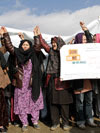 | ||
| Credit: Search for Common Ground |
-->
“When you sleep at
night, you just think: ‘Maybe I will wake up. Maybe I will not,’” says Shoqi Maktary, Search For Common Ground’s Yemen Country Director.
The war in Yemen is one of the most underreported humanitarian crises in the world today. The small country on the
Arabian Peninsula, packed with 27.5 million people, is suffering from a civil
war that’s now a proxy for others. Over a million people have fled their
homes. "People can’t access the
basics they need to survive,” says Maktary. Millions lack water,
medicine, or shelter.
Beyond the immediate mayhem caused by the fighting, the war has also deepened existing divisions and created new ones between Sunni and Shi'a, refugees and host communities. "I worry the violence is creating a new generation of young people who'll grow up with this hatred for each other," warns Maktary. (You can read here a Reuters article on the war and what can be done.)
In Yemen, most people accept violence as an appropriate way to handle certain disputes. It is common practice to discipline children at home and at school, using violence. War has exposed this everyday violence for what it is.
Search for Common Ground, a charity which partners with people across African, Asia, Europe, the Middle East and the USA to end violent conflict is trying to change this. Their team works closely with women, educators, migrants, young people and the media to develop a culture of respect, human rights and constructive problem-solving.
They have launched a peace-in-school program last year, training over 900 teachers, partners and government officials to understand the effects on violence on children's development. Their ability to resolve conflicts without violence has increased by 50%. Teachers tell stories about how students once triggered them to resort to violent punishment, but now the same behavior prompts them to discover why the kids are acting out. They say that they are committed to "break the stick." One teacher, Khaled, explains: "This training comes at a time when the school environment and community as a whole are overwhelmed with violence. We were in desperate need for such training."
Seeing the impact of the program, Yemen's Ministry of Education now wants their entire staff to take the training, which might lead to conflict resolution curricula in every school.
Maybe these children will build a better future for their country...
|

















